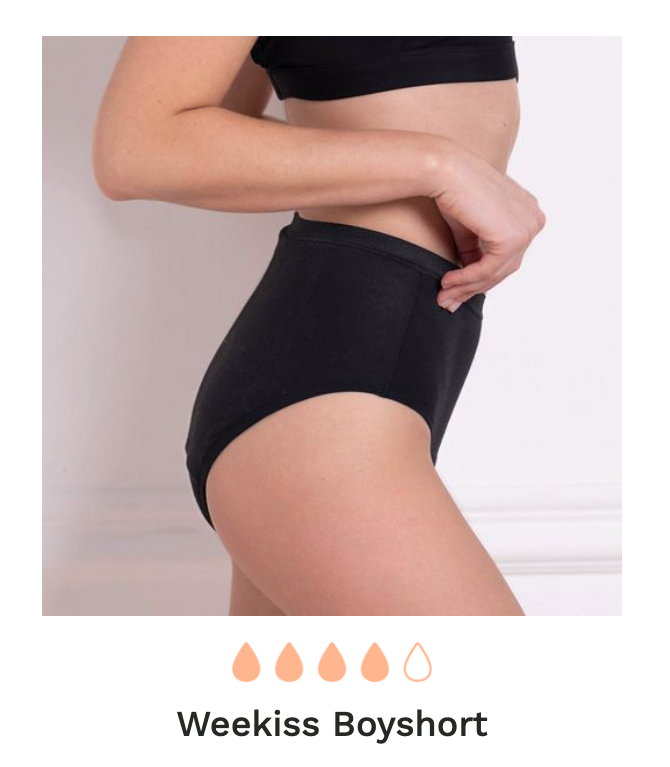Good body hygiene is undoubtedly important. Of course, this also applies to the intimate area. Many women, however, tend to be a little too good about cleanliness, especially in this area of the body. Why this is a mistake and what you should pay attention to when it comes to intimate hygiene is explained below.
Proper intimate hygiene - the most important things at a glance
- Frequent washing and the use of unsuitable care products damage the vaginal flora, which makes your vagina more susceptible to bacteria.
- A pH-neutral, fragrance-free soap is usually the best choice for daily intimate hygiene.
- Unless your gynaecologist has specifically recommended otherwise, limit washing to the external intimate area.
- By wearing high-quality period underwear, you can help prevent unnecessary stress on the vaginal flora during your period.
Why healthy vaginal flora is important
The vaginal flora naturally protects you from invading bacteria. If you wash your genital area too often and use particularly aggressive shower gel and perhaps even apply lotion to your genital area every time, you will do considerable damage to your vaginal flora in the long run. You destroy the natural protection against pathogens and the likelihood that you will catch an infection in the intimate area increases significantly.
The right products for intimate hygiene
If you look around, you will find a wide range of products for intimate hygiene. However, the vast majority of them are completely unnecessary for good intimate hygiene. Some products can even do you more harm than good. Not only can they affect your vaginal flora, but they can also cause unpleasant skin irritations and allergic reactions.
Products that you should avoid in intimate care include, for example:
- Intimate sprays
- Intimate hygiene wipes
- Deodorants
- Body lotions
Unless your gynaecologist recommends otherwise because of an existing health problem, a pH-neutral soap that is ideally fragrance-free is all you need for proper intimate hygiene.

How do I wash my private parts properly?
Of course you can and should wash your private parts every day. This applies both during your period and on the other days of the month. As mentioned above, it is recommended that you use a pH-neutral, fragrance-free soap. Use this to clean the outside of your genital area and then rinse it thoroughly with clean water so that no soap residue remains.
To prevent bacteria from getting from your bottom to your vagina, do not rub from back to front when washing. Wash your private parts normally by hand. You don't need a sponge or special wash mitt.
If you do want to use a flannel or something similar, it's best to use it only once and then put it in the wash. Finally, dry yourself well with a normal towel before getting dressed.
Should I clean the inside of my vagina?
Limit your intimate care to the outer intimate area. It is completely unnecessary to clean the inside of your vagina. This is because it normally cleans itself by eliminating things like micro-organisms and dead body cells through vaginal discharge.
If you clean your vagina from the inside with a vaginal douche, for example, you will disrupt this natural cleansing process, which will do you more harm than good in the long run. Therefore, do not use vaginal douches for intimate hygiene unless your gynaecologist has specifically advised you to do so.
Period underwear protects the vaginal flora
 Irrespective of the topic of intimate hygiene, you naturally need the right sanitary products during your period to ensure that the escaping menstrual blood is reliably collected.
Irrespective of the topic of intimate hygiene, you naturally need the right sanitary products during your period to ensure that the escaping menstrual blood is reliably collected.
Perhaps, like many other women, you use tampons for this purpose. That's fine in principle. However, as you know, you have to insert them into your vagina, which can sometimes affect your vaginal flora. If you want a gentle alternative that still offers reliable protection, you should definitely try period underwear.
Menstrual panties have a special membrane system that consists of several layers of fabric. This enables them to absorb and store the menstrual blood that escapes, so that everything stays pleasantly dry. Since you don't have to insert anything into your vagina, your vaginal flora is not unnecessarily stressed.
If you choose a high-quality panty made of breathable materials, such as Weekiss period pants, you will also avoid excessive sweating, which is good for both comfort and intimate hygiene.
Our conclusion on intimate hygiene
As you can see, for optimal intimate hygiene it is generally a good idea not to overdo it with washing and to use products that are as gentle on the skin as possible. This is especially true during your period, as your intimate area is more vulnerable during this time anyway, and overprotecting it increases the risk of bacterial infections even more.







